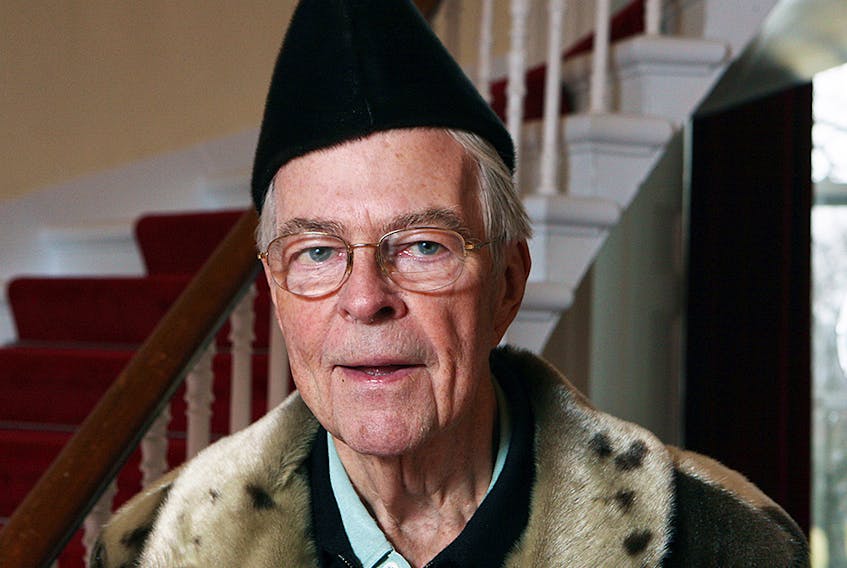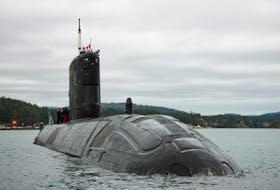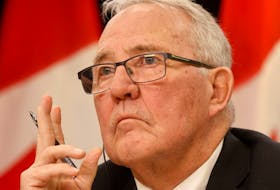For Newfoundlanders, it’s going to be a hard goodbye. For so many of us John Crosbie — so vivid and enduring a presence, his career and his character so rich in event and style — over time became something of a feature of the province itself; that stream of things that give this place its definition and essence, that constitute the Newfoundland way — the weather, our wild speech, and the crop of bountiful, outsized personalities, of whom John Crosbie may be close to the last.

Before I attempt to give an impressionistic sketch of the talented Mr. Crosbie it is but right and proper to pay tribute and offer consolation to his wife Jane. As any who were close to them knew infallibly, Jane and John, for the entire and wonderful term of their being together, were a team. There would have been no John if there had been no Jane. They were all things to each other. In a career so thick with tumult and triumph, from his early days in the cauldron of Smallwood politics, to the twilight coda he enjoyed as lieutenant-governor and chancellor of Memorial University, Jane was the bulwark and mainstay of it all. She counselled and cautioned him, was haven during the storms and a pilot for his many triumphs. This is no “behind every great man there is a woman” tripe. Jane was every bit his equal, the only difference being she chose the off-stage role. It is only right to pay full tribute to her part in the outstanding story of her husband.
Any understanding or appreciation of John Crosbie’s career has to begin with his entry into the dark and delightful phantasmagoria of post-Confederation politics, as it was conducted under the imperious, eccentric, frequently maddening and always intense leadership of the one and only Joseph R. Smallwood. Let me try a bit of eloquence here: Smallwood was quite the guy. No one like him before, and if there is a Providence, some hope there will never be another quite the same either. To compress the tale, Crosbie was invited into Smallwood’s cabinet in 1966, and in a matter of months became sternly disenchanted with Joey’s ways and means, was particularly offended — to his roots — by Joey’s dictatorial manner, and left cabinet the next year to lead a charge against Smallwood’s leadership and the man himself. Outside of Newfoundland it is near impossible to understand what a leap of courage (or politically suicidal folly) this was. Smallwood was no ordinary politician.

Within Newfoundland he was emperor, pharaoh, sultan and premier. In the aftermath of his successful campaign for Confederation with Canada he grew each year in standing and charisma, grew each year, too, in the fatal belief in his own significance, that his shining pate, bow-tie and signature horn-rimmed black glasses constituted the emblems and vestments of the Newfoundland messiah. He came out of the decayed school of “man of destiny” politics and the adolescent worship of heroes of history and the “great man” infatuation. And while Smallwood would never, not even in the high noon of his self-adoration, confuse himself with a Churchill or Napoleon, the overseers of vast empires or battles, within Canada’s newest province and Britain’s oldest colony, he undoubtedly saw himself as a Moses of the wharfs and outports, the Joshua who wrecked the ascendancy of the great St. John’s families, and put an end to the mercantile interests that had owned Newfoundland and its people since the days of Cabot; particularly the toiling fishermen and women of the multitudinous outports — the soul of the Newfoundland way.
Romance with one’s own self always leads to strange and eerie paths, and in the case of leader politicians, it is inevitably a road to megalomania. And if Smallwood didn’t quite descend into a clinical stage of the ego-malfunction, by the near end of his term, he offered a near perfect representation of what happens when self-admiration trips over into full self-worship, when the opinions of others, the idea of disagreement with the king, the suggestion that ways other than the king’s are to be even contemplated, are not simple errors to be corrected or thoughts to be debated, but offences, even blasphemies, to be scourged, mocked and ruthlessly put down. And those who harboured such heresies, and worse those who were courageous enough to issue them in public, were to be stomped on, exiled or crushed.
All this puts into a frame by which we can measure the one man who, at the summit of Joey’s sway and ruthlessness, stood up to challenge his grip and rule, to lacerate his practices and corruption, to run face-to-public-face against “the only living Father of Confederation” for the leadership of the party he, Smallwood, had invented, run, controlled and personified. That man was, had to be, rare, equipped with bowels of brass, and the stamina of granite.
And such a man was the now, sadly, late John C. Crosbie.

It is hard, and it may even be impossible, to convey to those outside Newfoundland, or even to those within Newfoundland a generation after, that battle, to understand the intensity, charge and overwhelming ferocity of the campaign.
Crosbie was not just an underdog. A generation of Newfoundland families knew no other leader, in fact — considering that Newfoundland government and politics itself has ceased to exist in 1933, when Newfoundland surrendered to the non-elective rule of a Committee of the British parliament — they had neither known a leader or electoral politics of any kind. Smallwood built the first two decades of post-Confederation Newfoundland — a school system, roads, hospitals, Memorial University. He brought old-age pensions and baby bonuses to the families of the island.
So the challenge was epic. And John Crosbie, at the beginning of this immortal fray, was the son of a Newfoundland first family, scion of the legendary Ches Crosbie, a veritable patriarch of the merchant aristocracy of St. John’s, the Water Street class incarnate. He was of that oligarchy, the consecrated few who never tasted the hardships and realities of Newfoundland life, the institutionalized poverty and circumscribed existence of the Newfoundland poor. An unlikely Galahad to take on “the little guy from Gambo.”

But the little guy from Gambo had morphed into the hard man in the Confederation Building, a threatening and sometimes cruel premier, who had castrated party politics as normally understood, and turned the Liberal party into his own personality cult. So Crosbie, despite his lineage, overturning the paradigm, had a real cause to fight. Smallwood had choked Newfoundland politics, made it an instrument of his whims, ran up a series of wild enterprises, mixed with mountebanks (Doyle, Valmannis), and turned government into a kind of private fiefdom. Nothing worked, no one progressed, except though Smallwood.
The Smallwood era, for the good of the province and the health of democracy, had to end. In 1969, after Smallwood said he would retire, Crosbie, who by then had quit the Liberal caucus, said he’d run to replace Smallwood as Liberal leader. Smallwood abandoned his plans to retire and said he’d run for the leadership, lest his critic Crosbie win the day.

Apart from his relatively patrician background and his Crosbie name there were other more particularly personal deficiencies. At embryo, Crosbie was a political dud. His speaking abilities (this may surprise some mainland readers) were little superior to those of a surf-abandoned crab. The corner broomstick had more charisma. And his door-to-door skills — at which Smallwood was a veritable Houdini — never measured up to that of a pack of Mormons urging the Watchtower on a busy and rabidly agnostic housewife.
Here was the first Crosbie miracle. From being a politician who couldn’t — out of shyness — keep his eyes open during an interview (I personally experienced that peculiar tic) and whose public addresses expanded the definition of tedium, Crosbie, through self-will and dedication, in a matter of months, virtually rewrote his public personality. He submitted to learning the arts and twists of public speaking, liberated a deeply dormant sense of humour and sarcasm (by which he became famous in a few years) and fashioned an oratorical style and vigour that mesmerized the crowds and won the cheers as much as the arts of Smallwood himself.

I do not know of anyone else in the public life of this country, who in so short a time transformed himself from a tearful incapacity in the quintessential political art of public speaking to full fluency and command. He fashioned an utterly personal, unique style, equally at ease with spontaneous riffs and prepared argument, and supremely gifted with hilarious sarcasms and (to the politically correct convent) outrageously direct unspeakable truths.
I have thought for a long while that the Smallwood-Crosbie match was Newfoundland’s Trojan War. There has been nothing in our politics since that parallels its fervour, bitterness, anger and duration, that placed old and new in such direct competition, that had two personalities so variant in manner but equal in determination.
John Crosbie revealed in that baptism of fire his most essential characteristic: courage. He (and his family) were scorched and mocked by a master arsonist and virtuoso declaimer. He never flinched. He always returned fire. He was, by the Liberal faithful, hated and despised. He took all that on. The Smallwood machine may have been old, much in need of repair, but it had years of practice, hundreds of hangers-on, people still in fear of “crossing the old man.” It was not going to be tipped-over, stripped of its parts, even by this one herculean challenge.

But Crosbie knew that even if he wasn’t going to “win,” that waging this necessary war would in a more fundamental and structural way put an end to the myth, dispel the aura of fear, shatter Smallwood’s mystique of charisma, and ultimately break his style of politics in Newfoundland forever. As it turned out, Crosbie was the Galahad of this Newfoundland moment. Smallwood won, but by the means of his winning, overthrew himself. Crosbie lost, but by the example of his campaign, and calling out without restraint all the repellent features of the Smallwood style and rule, eviscerated the Smallwood myth, and broke for good his unilateral hold on Newfoundland politics after 23 years of rule.
Shortly after, Progressive Conservative Frank Moores became Newfoundland’s premier, and put Crosbie in his cabinet, where he’d serve four years as a PC. With no belittlement of Mr. Moores intended, he was a farmer walking by on the side of the road, spied the Crosbie harvest, and was permitted to glean it.
There was a signature element in that transition, too. Crosbie was an alchemist in Newfoundland politics. He re-fused its elements. He fought the battle, broke the walls. But someone else picked up the trophy. It’s curious that John Crosbie never became the premier. At different stages later in his life, should opportunity or inclination have urged him, he easily could have. But no.
The fates always held stray cards when they played with Crosbie. He moved to the federal stage in 1976. Ever so briefly he was the minister of finance in the government of Joe Clark. It was his budget that provided the occasion of Clark’s defeat, and not incidentally the return of Pierre Trudeau as prime minister in early 1980. Crosbie, while never at the actual full centre of Canadian politics, has always been somewhat a curious lever of some of its highest moments, precipitating or tripping events of great scale.

My favourite anecdotal moment in all of Crosbie’s career occurred during his run for the Conservative leadership, ahead of the 1983 convention to replace Clark. For a while, astonishingly, this gruff, sarcastic, humorous and singular personality was No. 2 in the race. He was drawing the crowds, cheering the faithful, the media were mesmerized. There was this small concern. His French … well his French was inferior to his Armenian.
The press, particularly the Quebec press, ragged him on this. As they should have. But then one day he’s in Quebec and they are particularly insistent. Can you become leader of a bilingual country, a country that includes Quebec, and not speak French? Crosbie, by now a little intemperate over this always-present drag on his candidacy, offered the French Canadian press this shining pearl — perhaps the Platonic ideal of how not to answer a question on your way to a Canadian leadership contest. Crosbie to reporters: “Well, when I’m in China, I don’t have to speak Mandarin Chinese.” Politically speaking, compared to this answer lead balloons are flotation devices, and cucumber farming is the future of Newfoundland’s economy.
I regard this as a blunder of genius. Only a mind utterly ungoverned by the taboos of the moment could throw out an answer so totally uncompliant with the nostrums of our political day. It is an error so wonderful and complete that I worship it. It is the ultimate Crosbieism. So much better than the often retailed, but inferior taunting of Shelia Copps: “So pass me another tequila Shelia, and lie down and love me again.” That has, admittedly, flair, and considering its target not a little daring. But just a mere footnote, a halt, on the way to the heights of the China gaffe.
From a public life so crowded with events and so intimately interwound with the life of the province itself the unquestionable key moment, one of great melancholy for the province and I would guess an unspeakable burden for Crosbie himself, came in the early ’90s. This was the collapse of the fishery, the imposition of a moratorium, which was essentially a termination of the very defining activity of the province since the days of Cabot.
Crosbie, however, was a man of mettle. he went down the Southern Shore, just outside St. John’s, and there in the very middle of a crowd of very (justly) angry fisherman, gave the word and took their response. I cannot think of any other public man who could show such personal and political courage and integrity as to walk straight into a gathering of those most intensely affected and take their instant reactions, so to speak, on the chin
There is a Fate, and it is cruel — Crosbie was the minister of fisheries in Brian Mulroney’s cabinet; a Newfoundlander from a great family itself entwined with the historic fishery. And as minister and a Newfoundlander he was the one to carry the message to every other Newfoundlander that the cod fishery was to close. It was his hardest and best moment. I remember the day in ’92, know the place where he went to make the announcement, and recall nearly perfectly how it went.
Another minister, another man, would have chosen to announce it in a press statement, maybe stand up in the revered House of Commons and with due solemnity passed out the sad news. Or at the very least gone to the Confederation Building and used its Chamber of the House of Assembly to record the event. Crosbie, however, was a man of mettle. he went down the Southern Shore, just outside St. John’s, and there in the very middle of a crowd of very (justly) angry fisherman, gave the word and took their response. I cannot think of any other public man who could show such personal and political courage and integrity as to walk straight into a gathering of those most intensely affected and take their instant reactions, so to speak, on the chin.
He was razzed, shouted at, called all sorts of things. But Crosbie didn’t duck; neither did he bend. People came to admire the singular forthrightness of the moment, his refusal to duck, and his consistent determination — even in that confrontation — to always speak his real mind.
I bracket that moment with whatever moment it was that he determined that he could no longer allow Joey Smallwood to be the emperor of Newfoundland. There are too many episodes in this man’s illustrious stay on the provincial and national stage even to offer a catalogue. He was the real driver of the free trade agreement. He worked on the Hibernia legislation. He sought and got some form of compensation for fishermen after the collapse. And there are a hundred and more particular incidents of great meaning to individuals or groups that could be recounted. But this is a farewell and not a biography. Having known him long and admired and liked him always I leave the full story to better hands.
But I cannot end without at least taking note of the more personal impact he had on Newfoundland and its people. It emerged from his public role, obviously. But it was the individual, personal, character of the man that finally impressed him on Newfoundland’s consciousness the most.
During his partisan days the humour and offhand manner drew many to the politician, the public man. But in his post-political life, returning home to Newfoundland and his cottage-house on a pond outside St. John’s, showing up at local dinners and conferences, he became something more.
Crosbie entered this rare domain after his return from Ottawa, having chosen not to run for re-election in 1993. Let us call them the mellow days (mellow is a variable term when applied to Crosbie) of his resettlement back home. Day by day after his Ottawa life I think most Newfoundlanders started to feel the sense of Crosbie as one of the emblematic personalities that the island has produced in such profusions. John had a known-only-to-himself kind of charm. It washed over all but the most unrepentant and frozen partisans.
In personal contact I’ve seen him slag people who said hello to him, and slag them mercilessly — and this while he was the lieutenant-governor, and in a public place. And everyone in the room, including the slagee, was delighted John was being John. He burned me down and stirred the ashes more than once — and it hurt — but it was also a kind of medal that you had earned his glare.
Mostly though, to be personal, in my own acquaintance which spanned most of his career and my lack of one, I found his manner courteous in the old way, all charm and humour, no sense of affectation, and no great glee or smugness that he was “a personality.” The word may seem small, but John Crosbie became one the most likeable people in the whole province.
It is a hard Goodbye. But I honestly cannot feel more than a measured sorrow on learning of his passing. After all we had him for such a fine term. And John Crosbie — as was said by Johnson — added to the “gaiety” of our times and increased “the common stock of (not so) harmless pleasures.” He dispersed such joy and cheer among so many, just by virtue of being him, that even today it is impossible to think of him without a smile, and to be cheerfully grateful this lively, brave, smart, funny and lovely man walked and talked, as only he could walk and especially talk, among us.
I offer all sympathy to Jane and every member of the Crosbie family.
RELATED









